Banking Jobs vs. Fintech Jobs: Decoding Skills for the Future of BFSI
Table of content
- Introduction – From Corner Offices to Cloud Terminals, What’s in a Job Title?
- The BFSI Job Skills in demand – Structured Hierarchies vs. Agile Hustle
- Banking Jobs (One Side of the Coin)
- Fintech Jobs (The Other Side of the Same Coin)
- What’s Driving This (R)Evolution?
- Oracle and the Big Names and Backbones of Banking, BFSI Tech
- Top Skills of the Future, in Banking / BFSI and Beyond, to Watch (and Learn)
- Profinch Careers, Where These Worlds Come Together
- In Conclusion, The Labels Are Fading. And,
Introduction - From Corner Offices to Cloud Terminals, What’s in a Job Title?
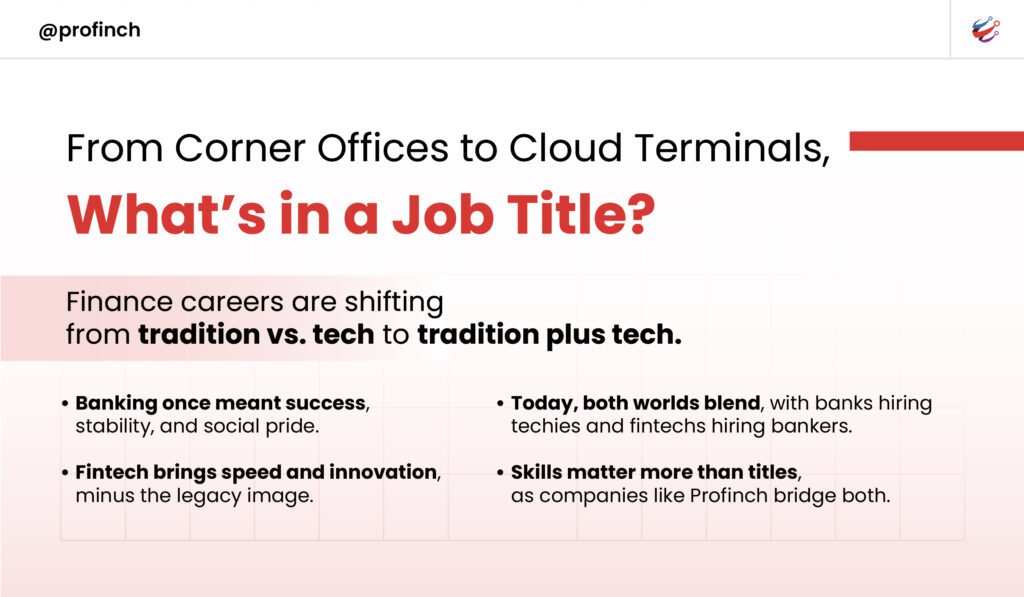
There was a time, not too long ago, when certain professions, I believe, carried with them a near-universal seal of approval. Doctor. Engineer. Banker.
In countries like India, and in many parts of the world, working at a bank wasn’t just a career choice, it was a marker of having “arrived”, epitome of socially accepted as successful. It meant job security, predictability, government-linked benefits if you were lucky, and more often than not, a quiet pride in the family or neighbourhood. It was a job, one’s parents could explain without effort, and a title, that neighbours could respect without question.
This reverence for banking jobs didn’t bloom suddenly one fine morning. It was shaped by a socio-economic landscape that had just begun to stabilise. Where trust, security, and tangible proof of progress, mattered.
Banks symbolised that progress. And so, for decades, banking jobs remained one of the aspirational career choice of the lower to middle-class family, even elites and the prestigious in the society.
Fast forward to today, and that landscape is changing, slowly, but unmistakably.
Enter fintech. Agile, digital-first, innovation-fuelled. These companies might not have marble-lobbied branches or a legacy brand name, (mostly because they do not advertise on Television on newspapers) but they are reshaping how the world saves, spends, borrows, and invests. And they’re doing it pretty fast.
The thing is, society hasn’t always caught up with this shift in perception. A job at a fintech startup doesn’t always evoke the same instant social validation, or glamour.
(BUT are millennials and GEN-Zs and alphas, or even the new age parents much concerned about the old social validations? I can’t say. Probably you know ;)
Yet globally, the market shouts (on social media) a different story. Fintech companies are being valued at billions, going public, and transforming not just consumer experiences but institutional frameworks. Their employees, product managers, AI architects, API strategists, are ‘living the dream’, the new age professionals, who may not have a cubicle but have global reach and a respectable lifestyle.
This isn’t a competition between old and new. It’s a shift from “either-or” to “both-and”. The BFSI sector today is a spectrum. And somewhere along that spectrum, the traditional and the modern not only coexist, they’re starting to overlap. A bank today might employ a blockchain engineer. A fintech might hire a compliance officer with 20 years of banking experience. Skills, not job titles, are the real currency.
In this article, am trying to explore the contrasting (and increasingly complementary) skillsets required in banking and fintech jobs. We’ll also touch on the global growth of BFSI careers, the rise of Oracle-powered financial technologies, and how organisations like Profinch are creating workplaces that combine the best of both worlds.
Because at the end of the day, whether you’re wearing formals to a branch or sneakers to a cloud lab, what really matters is, do you want to be part of a revolution, have a career, that is shaping the future of finance?
The BFSI Job Skills in demand - Structured Hierarchies vs. Agile Hustle
Let’s go back to daydreaming. And imagine two characters. 🙂
One working at a legacy bank, the other at a rising fintech. The environments they operate in are as different as test match vs T20 in cricket.
Banking Jobs (One Side of the Coin)
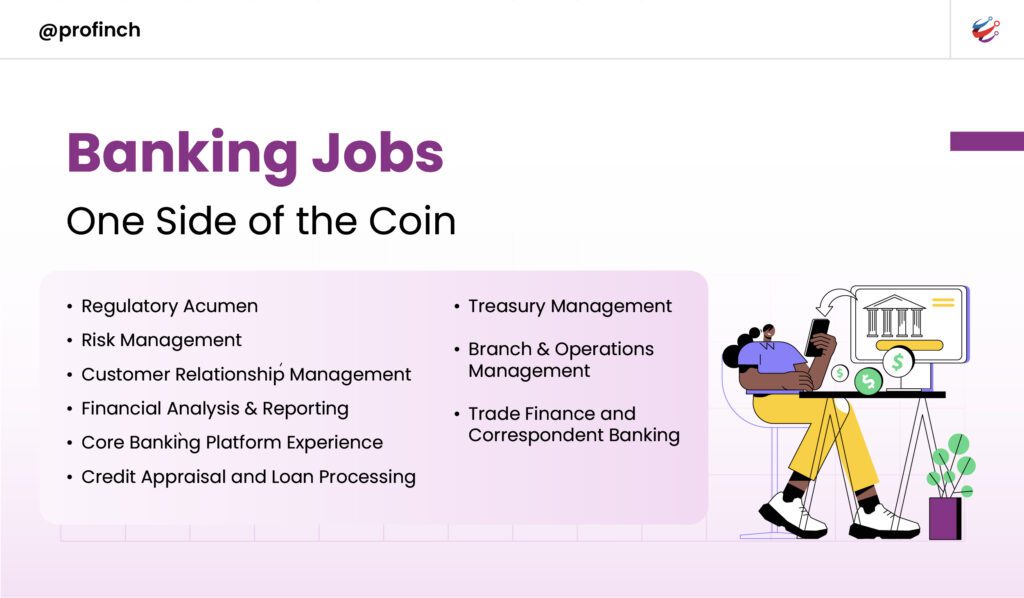
In traditional banking, the structure is the strength. Thus, job roles are clearly defined, most of the time. Risk and compliance teams are the gatekeepers. Technology teams often operate within regulatory boundaries. And, product cycles are measured, deliberate, and heavily vetted.
Here the dominant skills, in banking jobs, include:
- Regulatory Acumen: Having knowledge of frameworks. For example: Basel III, IFRS9, FATCA.
- Risk Management: Credit risk, operational risk, market risk.
- Customer Relationship Management: Especially in retail and corporate banking.
- Financial Analysis & Reporting: A strong grip on Excel, legacy MIS systems, and traditional ERPs.
- Core Banking Platform Experience: Like FLEXCUBE, Finacle, Temenos and many more
- Credit Appraisal and Loan Processing: This is fundamental to retail and MSME banking operations.
- Treasury Management: Handling of forex, investments, and interest rate strategies.
- Branch & Operations Management: This includes KYC, audit readiness, and front-office coordination.
- Trade Finance and Correspondent Banking: Especially relevant in corporate and international banking domains.
Of course this isn’t an exhaustive or all encompassing list. There are other roles as well.
The banking sector is vast, and skills vary based on function, geography, and also the size of the institution. But these areas broadly reflect the pillars of a traditional banking career. Structured, risk-conscious, and rooted in trust-building.
While the change is slower, it’s deep-rooted. And when banks do move, probably horizontally and vertically both, but especially with digital, core upgrades, expansion, and to serve the needs of modern banking customers, they need people who understand both the why and the how of that transformation. And that’s where the line starts to dissolve between banking jobs vs Fintech jobs.
Fintech Jobs (The Other Side of the Same Coin)
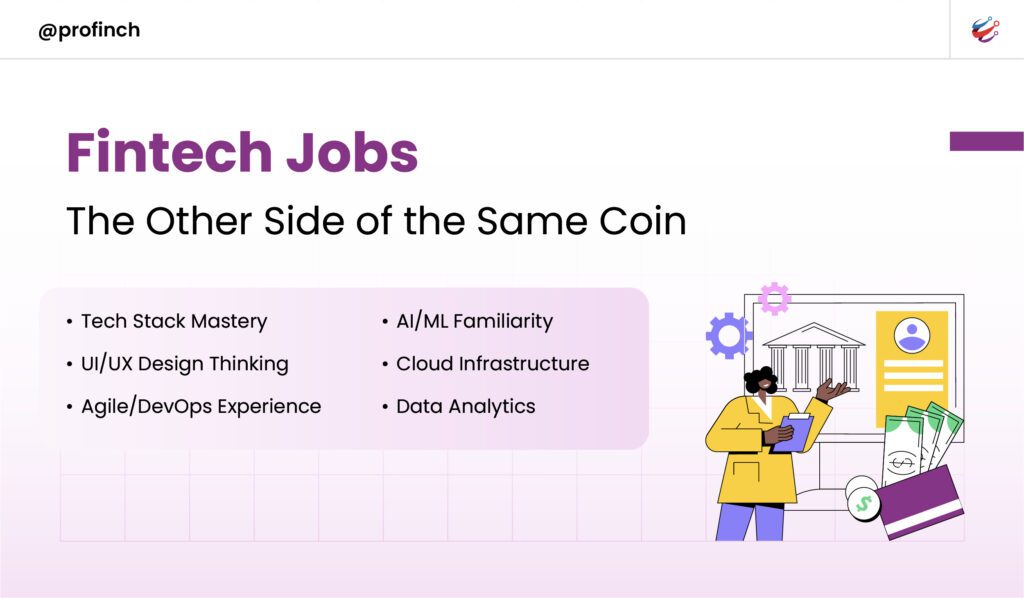
Meanwhile, in fintech, it’s not even rhetorically speaking that the air smells of coffee, and updates.
Ideas move fast. MVPs (Minimum Viable Products) go from whiteboards to manual user tests in weeks, sometimes days. Teams are cross-functional, no defined job role, and hierarchies are flatter.
Core skills here include:
- Tech Stack Mastery: Python, Node.js, Java, Kubernetes, APIs.
- UI/UX Design Thinking: Empathy-led digital journeys.
- Agile/DevOps Experience: Iterative development, continuous integration.
- AI/ML Familiarity: Especially in fraud detection, credit scoring, and personalisation.
- Cloud Infrastructure: AWS, Azure, Oracle Cloud.
- Data Analytics: Using tools like Tableau, Power BI, or R for real-time dashboards.
Interestingly, fintechs are not just tech startups anymore, they’re now regulated financial entities themselves in many markets, which means, the line between the skills needed in both environments are beginning to blur to death.
What’s Driving This (R)Evolution?
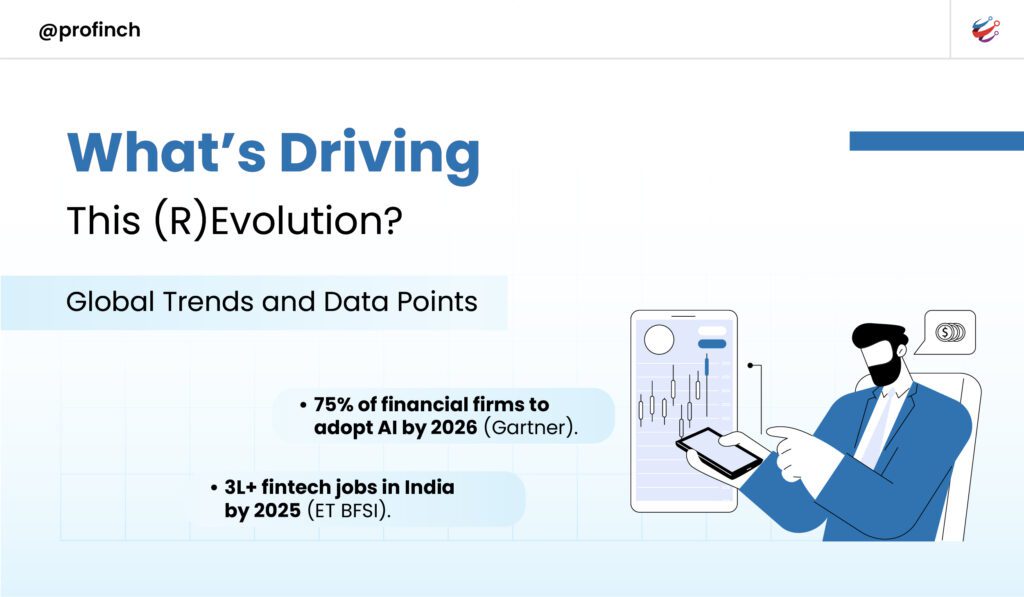
Global Trends and Data Points
- According to a report by’ Gartner’, by 2026, over 75% of financial services firms will deploy AI or machine-learning-powered platforms for risk, operations, or customer support.
- The global fintech market is expected to touch USD 882 billion by 2030. Growing at a CAGR of 17%. While the digital banking software market is projected to cross USD 25 billion by just 2028!
- India’s fintech sector alone, is estimated to create 300,000+ new jobs by 2025 (projected), riding on digital lending, open banking, and blockchain-based infrastructures (ET BFSI).
This upsurge in the industry demands professionals who are not just functionally sound, but also digitally native.
Oracle and the Big Names and Backbones of Banking, BFSI Tech
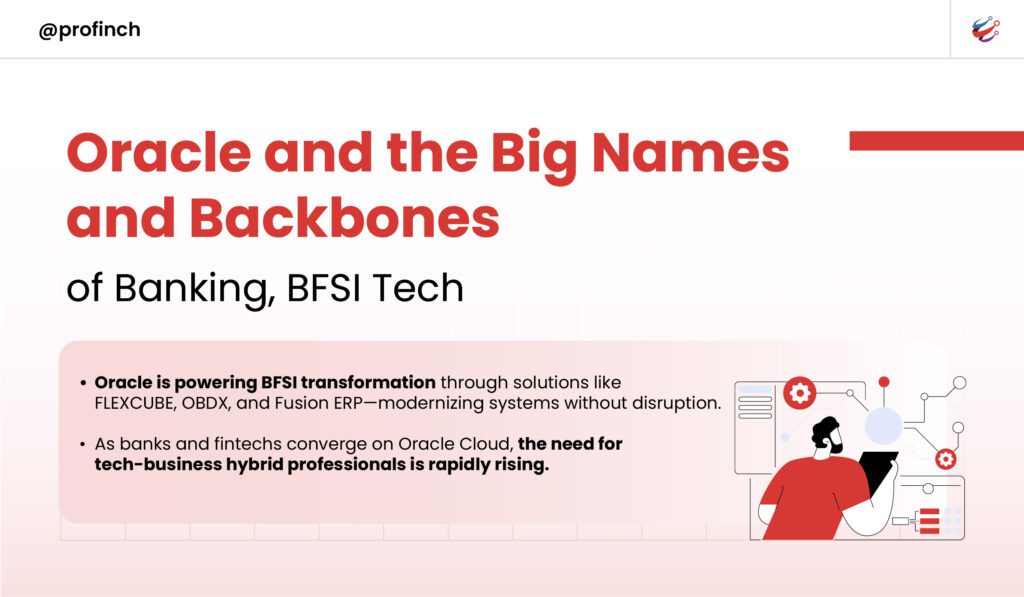
Oracle, with its suite of BFSI-focused solutions, like Oracle FLEXCUBE, OBDX (Oracle Banking Digital Experience), OFSAA, OIPA, Oracle Infra, Cloud and Fusion products, is swiftly enabling large financial institutions, globally, to modernise to latest technology and market needs, that too most of the times without having to uproot what they have, or lose business hours. Thats like road repairing work is on , but traffic movement is ensured for smooth passage. ☺️
As banks and fintechs increasingly converge on platforms like Oracle Cloud, there’s rising demand for professionals who understand these ecosystems, not just from an IT perspective, but from a business outcome lens as well.
Top Skills of the Future, in Banking / BFSI and Beyond, to Watch (and Learn)
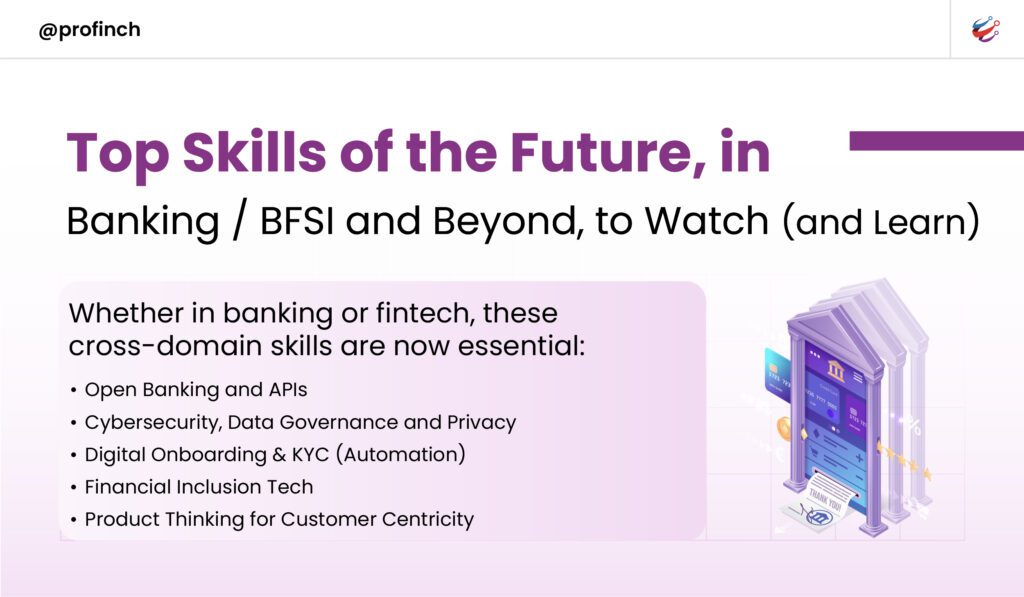
Irrespective of whether you are in banking or fintech, or making the switch between the two, here are cross-domain skills that are becoming essential:
- Open Banking and APIs
- Cybersecurity, Data Governance and Privacy
- Digital Onboarding & KYC (Automation)
- Financial Inclusion Tech
- Product Thinking for Customer Centricity
Beyond domain expertise, it seems the future belongs to professionals who can blend digital fluency with human depth.
This includes the ability to learn and navigate AI tools effectively, not to of course replace decision-making, but to augment it with better insights. Skills like prompt engineering, AI-assisted research, and workflow automation are already differentiating talent across roles.
Equally critical are the so-called soft skills. Which, in truth, are anything but soft. Emotional intelligence, storytelling, collaboration, and the ability to lead through ambiguity are fast becoming ‘non-negotiable’.
The more machines capably handles the predictable, the more valuable the uniquely human becomes.
I believe, the BFSI jobs or fintech career choices of tomorrow will not be about which side of the fence you started on, it will be about how adaptable, collaborative, how tech-literate you are, and just as importantly, how’s your EQ doing the rounds.
Profinch Careers, Where These Worlds Come Together
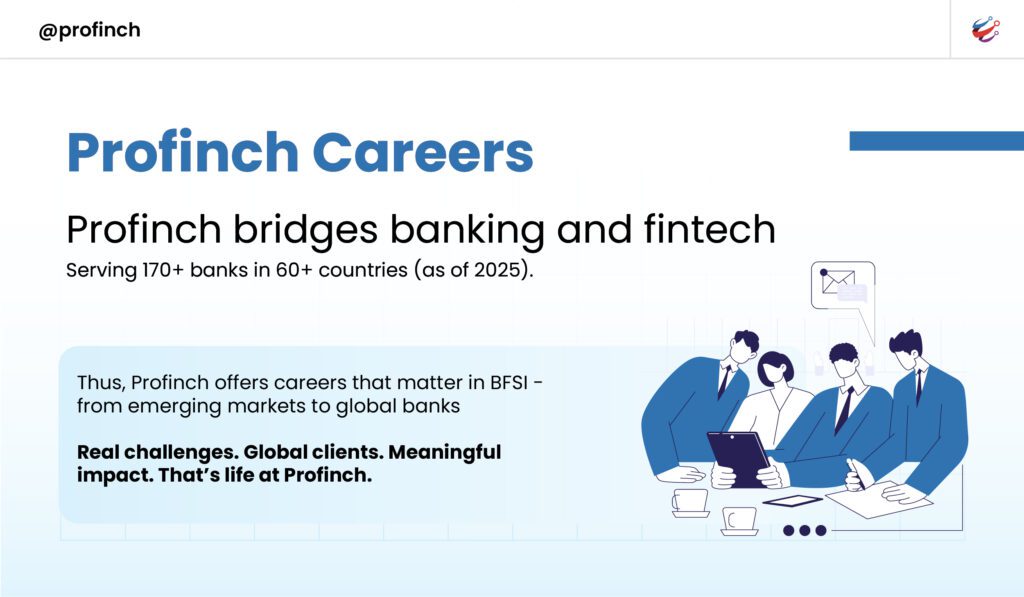
At Profinch, we’ve been privileged to sit at this intersection of banking tradition and fintech innovation. With over 11 years of championing one of the toughest decades in terms of finance tech advancements, and with 170+ top banks and FIs as clients, across 60+ countries, as of 2025, we’re are thereby fortunate to be able to offer careers in both, proudly, globally.
Profinch, though is just a decade old, growth-stage, mature startup, and is making waves in the BFSI sector with innovative digital transformation solutions. Our clients are some other bigger banks and financial organisations, worldwide.
Thus, this stage of rapid expansion and dynamic challenges offers students a rare and unparalleled learning experience.
Our existing teams include ex-bankers, coders, product thinkers, marketers, designers, and also transformation consultants, and the Don Drapers of sales. All working together to solve real-world financial problems at scale.
If you’re someone who speaks or wants to speak anything modern in BFSI, Profinch is your kind of place.
In Conclusion, The Labels Are Fading. And,
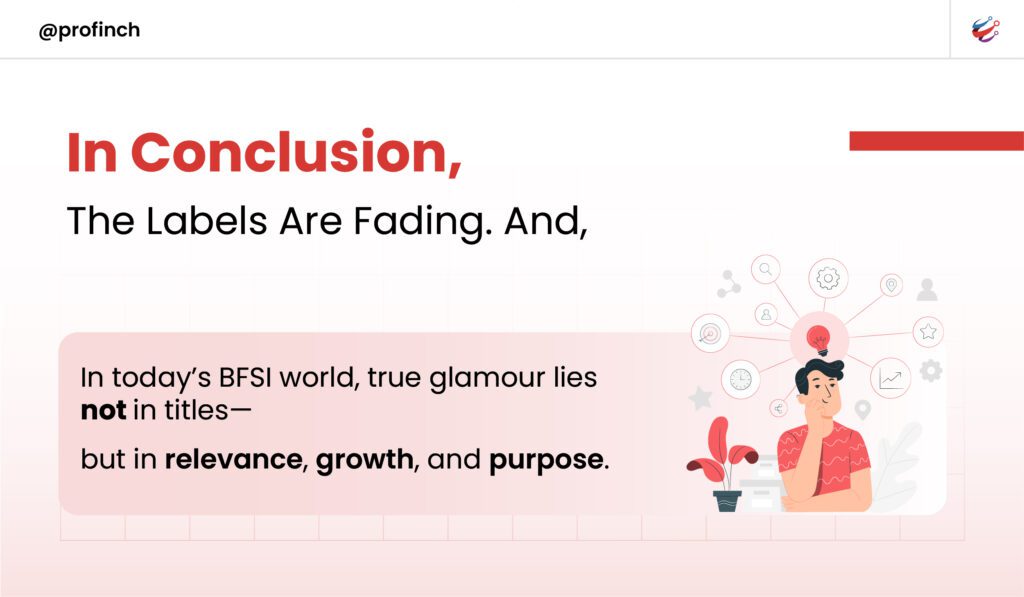
The glamour and pride once attached to certain job titles is now being reshaped, albeit slowly but happening. Working in BFSI today, whether in a traditional bank or a fintech startup, is about relevance. And, purpose.
Both offer scale, but the other, is for those who love speed, challenge, and unlimited growth potential.
So, whether you find yourself wearing a blazer to a boardroom or a hoodie to a product sprint, ask yourself, ‘am I learning?’, ‘am I evolving?’ And most importantly, ‘am I building something that will matter twenty years from now?’ (The iconic ‘बीस साल बाद ‘ or ‘twenty years later’ storytelling practice in Bollywood’s most iconic movies).
That’s where the real glamour lies.
From the Marketing Desk @Profinch
Speak to us to understand how we are using fintech in shaping the world of finance.
